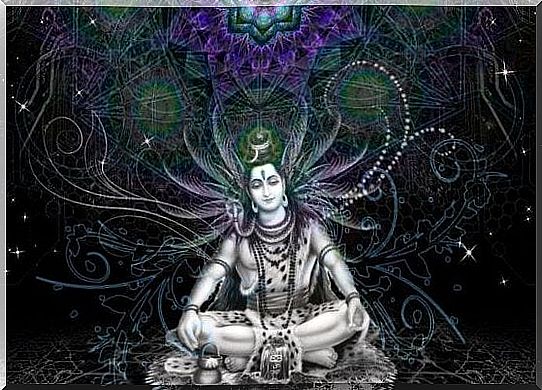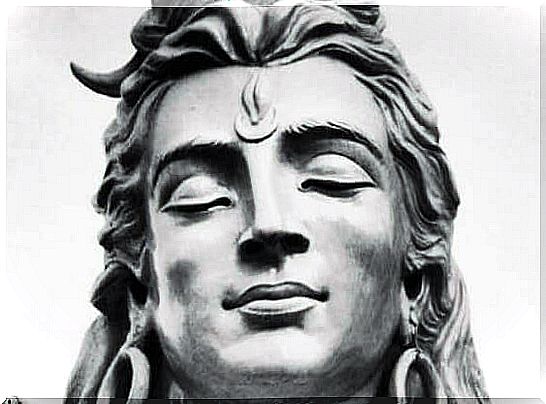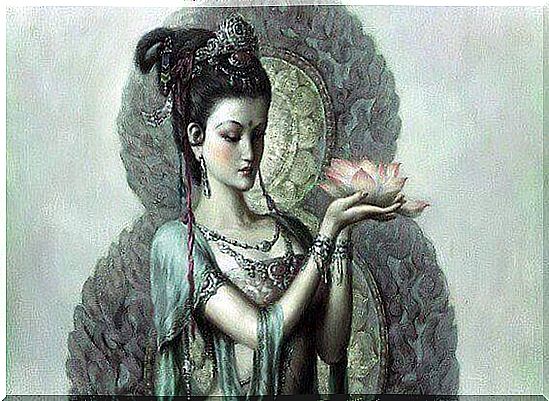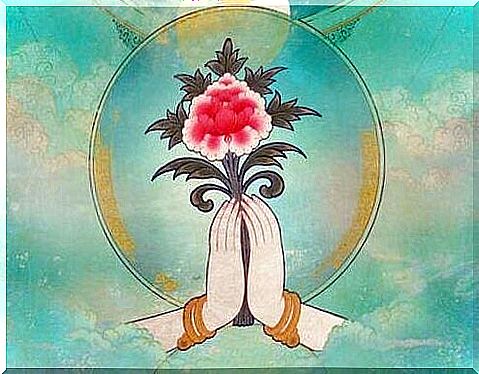7 Steps To Being Happy According To Hindus

The legend of the Hindus tells the story of the only happy man in their ancient kingdom. Many of the inhabitants of that place were rich, yet they could not enjoy what they had. They always wanted more. For this reason, they spent most of their time doing business to increase their fortune. Others, on the other hand, were very poor, yet they were not happy either, since they devoted a good part of their existence to dreaming of what they did not possess.
When it became known of the presence in the kingdom of a fully happy man, the population immediately showed a strong interest. The rumor spread that the man possessed a casket in which he kept all the secrets to achieve happiness. The rich went to the man in an attempt to buy the casket, but he did not sell it. The poor begged him, but the wise man did not give in to their pleas. Then they tried to steal it, but they couldn’t.
Some time later, a child went to visit the man with the casket. She told him that he too wanted to be happy. Faced with the innocence of the child, the happy man was moved. He told him that happiness is like a ladder, and that each step implies a new teaching. So it was that he showed him the seven steps to be happy.
First step: cultivate self-love to be happy
The man with the casket told the child that the first condition to be happy is to love oneself. Self-love means feeling that you deserve happiness. For this reason, it is essential to give value to one’s life, taking care of one’s health and physical well-being.

Furthermore, it is necessary to understand that we are unique beings in the world: each of our virtues and our defects are the result of a unique story in the universe. We are nothing but the effect of hundreds of thousands of unrepeatable variables.
Second step: act, put into practice
One of the greatest causes of unhappiness is the t endenza to want to be the best and hope for a better life, without, however, ever go beyond the stage of thought. Such an attitude can only lead to frustration and guilt. If you think you can do something or you have to do it, just do it. There is no reason to procrastinate any further.
It is also important that actions are consequent to words and, of course, to thoughts. Thinking one way and acting the opposite will only create confusion. Conversely, if there is harmony in one’s internal world, everything will flow easily.
Third step: eliminate envy
Those who live by focusing on the goals of others rather than their own are paving their way to frustration. We can’t know what a person went through to get to where he is, so we don’t have the right to judge whether he deserves it or not.
Instead of thinking about other people’s goals, think about yours. By sowing the seed of envy in your heart, you will only suffer. A useless and destructive suffering. If, on the contrary, you manage to be happy for the successes of others, your happiness will be double and you will find in you the strength to achieve your goals.
Fourth step: fight against resentment
Sometimes we receive insults and confrontations that are so hard that they spread pain in our hearts. Over time, that pain turns into frustration and the latter into anger. We end up being invaded by a very negative feeling, which paralyzes.

Rancor is another of those useless passions that only end up causing damage to those who feel them. In life, everything has its own logic: for this reason, when faced with confrontations, think about the fact that those who caused them will receive their justice. Sooner or later, everyone collects what they sow. It is therefore essential to learn to forgive, forget and let it go.
Fifth step: do not appropriate what is not really
According to the Hindus, everything that is unduly removed from others causes serious consequences. Over time, those who commit such a gesture will find themselves losing something of immense value. If you do not respect the goods of others, sooner or later even what is proper vanishes.
This rule does not only apply to tangible assets. It also has to do with the theft of ideas, affections or benefits that do not correspond to us. According to Hindus, disrespect for everything that belongs to others is the basis of a person’s moral and material ruin.
Sixth step: eradicate all forms of mistreatment
No living being deserves to be mistreated. This includes people and, of course, plants and animals as well. Those who manage to harmonize with life can achieve happiness. All living beings are a source of joy and well-being, and for this they must be respected.
This, of course, implies a radical refusal to be mistreated. It is right to be rigid in trying to reject any situation or person that threatens to mistreat us. No form of mistreatment is “for our own good” or for the good of others. To grow and correct your mistakes, it is not necessary to assume destructive attitudes.
Step 7: be grateful every day
It is very easy and will have a huge effect on our emotions. There are reasons to be grateful every day, don’t doubt. If you get into the habit of saying “thank you” first thing every morning, you will see that your life will be filled with color.

It is a very simple ritual that can change a person’s life. If it becomes a habit, it will allow you to face the day with positivity. It will make us happier, turning us into more generous people. Furthermore, we will be able to look more clearly at the enormous value of our life.
As we have seen, the 7 steps to be happy are like a ladder: they are reached one after the other, constituting an evolutionary process that leads to inner peace. That peace is the only essential element in order to be happy. And happiness is a stage of life in which all the vicissitudes of life are accepted with humility and intelligence.








